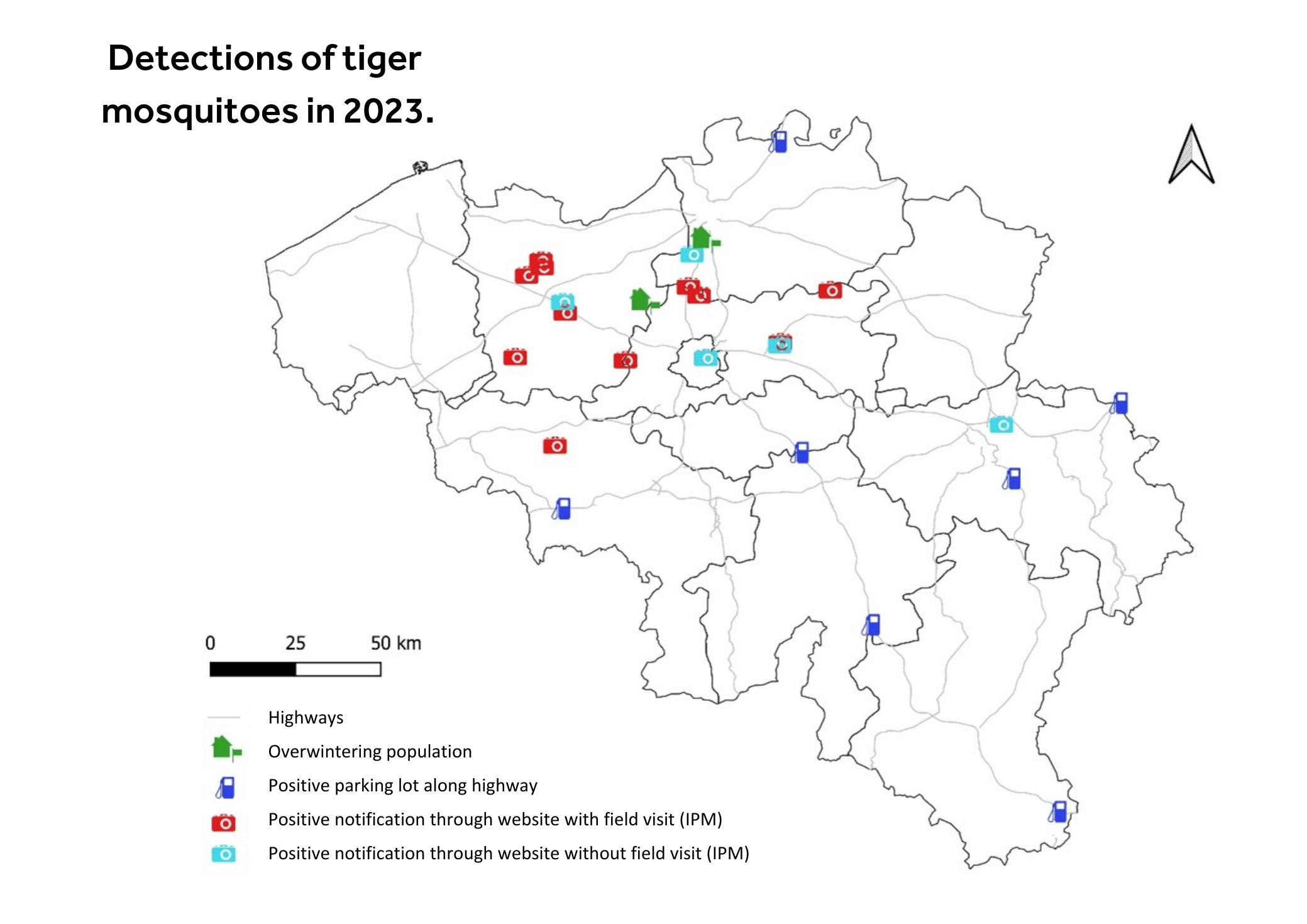In short
Exotic mosquitoes, such as the tiger mosquito (Aedes albopictus), are spreading in Europe as a result of increased globalisation and climate change. They were able to establish themselves in Southern Europe and now they are spreading northward and have also been spotted in Belgium. This mosquito species can transmit viruses such as chikungunya, dengue and zika.
Currently, the tiger mosquito is starting to become locally established in Belgium, as it is in our neighboring countries. Therefore, the early detection of new locations with tiger mosquitoes will enable to put in place control and prevention actions in order to delay its establishment and consequently to prevent outbreak of mosquito-borne diseases (e.g. chikungunya, dengue or Zika).
The MEMO+ project aims to monitor the introduction of exotic Aedes mosquitoes, such as the tiger mosquito, in Belgium. Sciensano coordinates the project and is responsible for the citizen science platform that allows citizens to notify the presence of mosquitoes by uploading their pictures to a website. Morphological identification of the mosquito in the picture is done to determine whether it is a tiger mosquito or not. Aside of that, Sciensano communicates with all partners (federal, regional, local) and with the citizens about the tiger mosquito situation in their municipalities. The Institute of Tropical Medicine Antwerp coordinates the field activities and confirms the presence of the tiger mosquito in the field.
Report a tiger mosquito via www.MosquitoSurveillance.be or the mobile App currently available in french (Android and Apple) or in dutch (Android and Apple)
Project description
Introduction of exotic Aedes mosquito species has been recognized as a potential threat for public health in Europe and also in Belgium. These mosquitoes can be vectors of viruses like chikungunya, dengue and Zika. Therefore, the surveillance of mosquitoes is of paramount importance to prevent or delay as much as possible their introduction and establishment in Belgium.
In order to prevent mosquito-borne diseases due to autochthonous transmission in Belgium, a number of elements need to be in place including:
- a good surveillance of exotic Aedes mosquitoes
- a good surveillance of mosquito-borne diseases
- and an integrated analysis to timely combine and interpret these informations
These elements are of paramount importance and only a good synergy among these elements can ensure to successfully prevent local transmission of mosquito borne diseases.
In this context, the MEMO+ project ensures the monitoring of exotic Aedes mosquitoes in Belgium based on two independent but complementary parts:
- Passive surveillance (Sciensano): relies on citizen science, based on the MosquitoSurveillance platform (website and App) for the notification of the tiger mosquito by citizens. The surveillance is based on the morphological identification of the mosquito pictures uploaded on the platform.
- Active surveillance and field activities (ITM): are based on inspections and monitoring of exotic mosquitoes in the field by placing mosquito traps and performing larval collections
This combination of citizen surveillance and active surveillance allows us to early detect the introduction of exotic Aedes mosquitoes, in particular the tiger mosquito, in the whole territory of Belgium.
For questions or more information about the MEMO+ project, contact the project responsible Javiera Rebolledo Romero.
Results
The map below shows the locations where the tiger mosquito was detected during the 2023 mosquito season. More information in our annual reports.

Press releases
2024
- Des moustiques tigres observés à neuf endroits depuis mai en Belgique : les citoyens appelés à une vigilance continue (26/08)
- Tijgermuggen waargenomen op negen locaties sinds mei in België: een oproep voor verdere oplettendheid! (26/08)
- Attention à tous les citoyens : la saison des moustiques a commencé, rejoignez la recherche des moustiques tigres! (21/05)
- Burgers opgelet: het muggenseizoen is begonnen, ga mee op jacht naar de tijgermug! (21/05)
- Deux fois plus de moustiques tigres signalés en Belgique. (22/01)
- Dubbel zoveel tijgermuggen gesignaleerd in België. (22/01)
2023
- Le moustique tigre survit à l’hiver belge. (18/08)
- De tijgermug overleeft de Belgische winter. (18/08)
- Appel à tous les citoyens : Aidez-nous une nouvelle fois à trouver des moustiques tigres! (22/05)
- Oproep aan alle burgers: Speur opnieuw mee naar tijgermuggen! (22/05)
2022
- Un nombre inattendu de moustiques tigres trouvé par des citoyens en Belgique. (12/12)
- Onverwacht veel vondsten van tijgermuggen door burgers in België. (12/12)
- La plateforme de science citoyenne permet la découverte d’un moustique exotique. (28/07)
- Burgerwetenschap leidt tot de vondst van exotische steekmug. (28/07)
- Aidez-nous à trouver les moustiques exotiques en Belgique! (30/05)
- Speur mee naar exotische muggen in België! (30/05)
Sciensano's project investigator(s):
Service(s) working on this project
Partners








